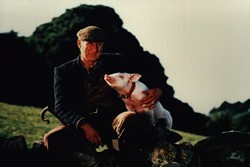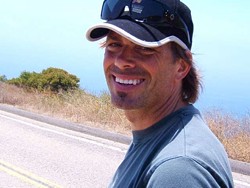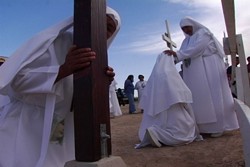Ask a real estate agent or someone from the Visitor's Conference Bureau to describe San Luis Obispo, and they'll likely tell you that it's ideally situated between Los Angeles and San Francisco more purgatory than actual destination. Too California for Sundance, not quite plastic enough for the Oscars, and not nearly European enough for Cannes, when it comes to film, SLO has no choice but to carve a new and radical niche in the industry.

- THANK YOUR LUCKY PIG : James Cromwells film career got a huge boost after he played Farmer Hoggett in Babe. The vegan would never consider slaughtering an animal for food in real life.
# Call her crazy, but the San Luis Obispo International Film Festival's new executive director, Wendy Eidson, would like to focus this year's festival on the films. More than 85 films screening March 1 through 11 present something for the county's biggest movie nerds, the 13-year-olds who won't watch anything that doesn't feature a car chase, the discerning viewers who know that Hollywood is only capable of producing filth, and everybody in between.
This year, the festival is breaking with tradition by presenting the King Vidor Award for Outstanding Career Achievement in Filmmaking to two recipients: Norman Jewison and James Cromwell.
James Cromwell has appeared in countless television shows, including All in the Family, several Star Trek series, ER, and Six Feet Under, as well as films like The Green Mile, L.A. Confidential, and, recently, The Queen. He was nominated for an Academy Award for Best Supporting Actor for the role of Farmer Hoggett in Babe. Cromwell recently took some time to discuss the film industry, activism, and William Randolph Hearst with New Times.
NEW TIMES What criteria do you take into account when deciding which roles to accept?
CROMWELL I can't do something I don't believe in or that I think is untruthful. I want to do something where the entirety of the project makes a difference and holds, as Shakespeare says, the mirror up so that we can see ourselves and maybe make better choices than the ones my characters may be making. Now, those are wonderful goals but they don't always work out because sometimes you just have to work on Maggie's farm, no matter what you believe. I've done very little that I'm ashamed of, one or two things which I wish I were not in, but when I did them I didn't see that I had a whole lot of choice.
NEW TIMES Do you consider Babe the film that took your career to a new level?
CROMWELL Well, of course, any film in which you get an Academy Award nomination takes your career to the next level. I didn't have a career before Babe because nothing in this industry counts for much except for the success of your last picture. Once you get an Academy Award nomination, people assume 'Oh, he can act.' In Hollywood, because I did All in the Family, people assumed that I did situation comedy and couldn't do anything else. My agent would say 'Jamie, I'm trying to get you a role in a serious film but everybody thinks you're a comedian' even though I had done Hamlet and any number of roles in the theater that were serious. Then you get Babe, and the next picture you get you play a sinister and vicious cop and people don't know what to do with you. Are you a pig farmer or are you a heavy? So they split it in the middle, and I play a lot of presidents.
NEW TIMES Having played all those presidents, have you ever

- HOLLYWOOD ROYALTY : The Queen is very much focused on its title character, but James Cromwell plays the lurking title characters husband, Prince Philip, to imperious and pained perfection.
CROMWELL Well, I have almost no confidence in electoral politics. I think it is, at least as it is in this country, an incredibly flawed system. I've been connected to politicians from a very young age because I went down South during the civil rights movement. I was in Mississippi when a friend of mine, Mickey Schwerner, was killed. A little later I became involved in the anti-war movement and I worked with the Black Panthers. I've also worked for the American Indians. They were all justified and worthy causes and, for the most part, those causes have been frustrated by politicians. It would never occur to me to run for office. That doesn't mean I don't have an appreciation of what it is to be effective in politics. Most everything is politics. There's politics in my own industry, which is almost as perplexing as the politics of the United States government.
NEW TIMES What is your dream role?
CROMWELL Lear. He is the Everest of roles.
NEW TIMES You've portrayed non-fictional characters on several different occasions, including recently in The Queen. Is that more difficult than portraying a fictional character?
CROMWELL I don't know whether it's easier or not. You know, I'm not them. I'm not Prince Philip. I can't change my physical appearance to match Philip. I can't get six inches shorter, or seven, and I can't change my nose. I don't do caricatures, so it's always me whether it's a real person or a fictive person. I try to know what the person is about. In the case of Philip, I wanted people to understand that I think that the royalty is out of touch and that they are privileged to an incredible degree but I also wanted people to appreciate that this man's life was under attack, but that seems to have made no impression on the American public. Everybody comes and says 'Oh, you're so mean and awful as Philip.' Acting is to do it well always hard. To do it really well is almost impossible.
NEW TIMES In RKO 281 you portrayed William Randolph Hearst. Did you visit Hearst Castle during filming or draw any conclusions about Hearst?

- VITY DREAMER: Frank Suffert, who directed Desert Dreamers, has a lot to say about the significance of artists and their dreams and you might find that he harbors a number of dreams himself.
# CROMWELL I did not visit Hearst Castle, because we shot in England. I've passed San Simeon a number of times but never actually gone up. In fact, I really have no interest in going up. Of course, I have an opinion about the man. Hearst began, much like the character in Welles' film, as a blueblood, and great wealth affected him badly, as it seems to affect most people. I understand that he played the anti-Semitic card in Hollywood when he was trying to get back at Welles. I think this country is anti-Semitic and racist anyway, so he simply did what any good red-blooded American would do, but I thought that Orson Welles' sophomoric joke at Hearst's expense was the provocation that caused Hearst to destroy Welles' career. You know the significance of Rosebud? The beginning and ending of Citizen Kane take place in San Simeon, and Hearst is sick. The last thing he says before he dies is 'Rosebud,' so they go all the way through the picture trying to figure out what Rosebud meant. At the end it turns out that it's a sled that he had as a boy. That's the story. 'Rosebud' is actually Marion Davies' vagina. That was an endearment between the two of them. Marion got drunk and went into the powder room and let it drop that Hearst's endearment for her vagina was Rosebud. That person told Mankiewicz who told Welles. Welles wanted to use Rosebud in the film. RKO 281 is a story that really hinges on Orson Welles' immaturity and mean-spiritedness. My impression when I saw Hearst was that he adored this woman. He seemed totally charmed by everything she did.
NEW TIMES When people recognize you on the street, what project is it usually for? Do they yell 'Hey, there's the farmer from Babe?' or 'Is that the guy from Star Trek?'
CROMWELL What I'm most pleased with is that most people come up to me and say 'I like your work.' They see me as an actor, not as a movie star, and they don't see me as the role, so they don't say 'Oh, it's Farmer Hoggett.' They see the actor, which means they recognize the craft and they see something in me that they like as a person. That's very important to me.
NEW TIMES You've been nominated for an Emmy, you've had films nominated for an Oscar and a Golden Globe, you've even won a Teen Choice Award for Choice Movie Bad Guy do these awards actually validate your work?
CROMWELL The only validation that counts is self-validation. Any validation from someone else can be withdrawn. They'll validate you one day and trash you the next. When I got the Academy Award nomination, the head of the Academy told all of us nominees that being nominated is winning because it means that your peers have picked your performance out of all the films done in that year and that there are five of you who have done exceptional work. That is winning. The person who wins the Oscar, that's a crapshoot. That's politics. That's about studios. That's about the corporations that run the studios.
NEW TIMES What is your favorite aspect of the film industry?
CROMWELL There are extraordinarily talented and courageous people in this industry who work in spite of all the challenges. I respect a great number of my peers. I have a very soft spot for actors in general because we're at the mercy of directors and forces beyond our control and yet we're held responsible for the performances we give as though we hold the camera, and filmed the thing and wrote it and publicized it and it ain't necessarily so. I'm interested in self-expression the expression of what it is to be human and how art affects and informs and illuminates and comforts and mobilizes people everywhere. That's why we do it. I wouldn't be as sour as I may sound if I didn't think the potential for film was infinite.
NEW TIMES What do you do when you're not making films?

- BOTTLETREE RANCH : All of the artists in Frank Sufferts Desert Dreamers have their own unique vision, and Elmer Longs glass gardens are among the likeliest of the unlikely projects they create.
# CROMWELL I'm interested in almost everything other people's jobs and lives, how things work and how they don't work, a walk in the woods or riding my bicycle, going to the theater or having a good conversation over a great meal, reading a wonderful book. This doesn't last long this life, you know and when it ends it really ends. It's over, as far as we're concerned. I don't actually believe that, but I'll know when I get there. So, if you don't enjoy every moment, damn man, that's not much fun.
Filmmaker Frank Suffert has directed commercials, music videos, and documentaries. His recently completed documentary, Desert Dreamers, will show at the Palm Theatre on March 8 at 2:30 p.m. Desert Dreamers creates a portrait of the Mojave Desert through the vision of the artists and spiritualists who seek space, inspiration, and God in its expanses. Suffert and the film's producer, Lillemor Mallau, will also attend the preview for a Q&A session.
NEW TIMES What was your vision for this project when you began filming?
SUFFERT I had written a script that had, as a lead character, a strange desert hermit artist, and I felt I didn't know much about these artists and wanted to find out more. My vision wasn't really just to interview them, but to bring them out in this context. I see a lot of myself in them, because, as a filmmaker, you're always trying to do the impossible, make a movie with no money and come up with an idea and just no matter what finish it. That's who they are. They're these people that come up with these crazy ideas for art or for a museum or something and they'll work for years and years. I was amazed at their philosophy, and I think the film transcends their personalities and finds something that they all have in common, because ultimately it's a spiritual movie. For me, at least. I think everybody finds something else in it. For me, it's about doing something with your life that you can look back on, however crazy it is, rather than going forward with your 9-to-5 job every day, and just leaving something behind that you feel was worth your time on earth.
NEW TIMES Did you have any idea what type of people you were going to find when you got out there?
SUFFERT I've been out there quite a bit because I shot commercials out in the desert. We always had these strange characters around the set and I knew that there were strange people there. I wasn't sure to what extent I would run into them and how friendly these characters would be because a lot of them are a little hostile, to be honest. These people that I found were really kind because they're artists and they want to be found.
NEW TIMES How much time did you spend with the people you interviewed?
SUFFERT I went back to everybody at least twice, and then I stayed one or two days with them. Some people I visited three times. It took another three years after the first interview when I got out there the first time.
NEW TIMES Clearly, you don't hold with the negative stereotypes of these desert dwellers, yet your film demonstrates that you are aware of them. Were you aware of these stereotypes from the moment you began filming?
SUFFERT I think that was my intention, because everybody has these stereotypes to begin with, and in order to get people interested you have to almost let people laugh at these people and say 'Look what weirdos are out there.' As the film continues, it sort of surprises you as these people say these very wise things. I think if I had started with that right away, had let the cat out of the sack, people probably wouldn't be as interested. There would be no change of opinion. I would just be one opinion against theirs. I had to start with their stereotypes and take them apart slowly.
NEW TIMES What did you have in the way of a film crew and equipment while shooting this? Was it just you and a camera?
SUFFERT At the biggest, we had five people, and the smallest was me and the camera for four days alone in the desert. For the most part there was our producer, Lillemor Mallau, and myself, and sometimes we had one other person, an assistant to help us.
NEW TIMES Desert Dreamers poses the idea that either you understand these desert dwellers or you don't. Why are some people driven to judge them for the way they live?

- HAIL SOMEBODY : Spirituality plays an important role in Desert Dreamers, as the various dreamers reveal their own version of religion or spirituality and its role in their unorthodox lifestyle.
# SUFFERT If you are a bank employee and you have to be at your job at 9 every morning and you go home at 5, you're going to see that life as normal, and everybody outside that norm you kind of want to judge. Californians are more used to individuals with different lifestyles. But everybody has the idea that their own world is the way that the world should be and they all create justifications for why they have to have a 9-to-5 job and why anybody who doesn't do that is a social outcast. These people really defy the norm, and they're happy. The problem would be if everybody did that, nobody would be paying taxes and supporting the economy. Artists are there to open eyes for the rest of us, and I think these people do that in their own way.
NEW TIMES You clearly wanted to convey your own opinion of these people through the narration. Why did you make the decision to add your own voice to the voices of the desert dwellers?
SUFFERT I was against narration for a long time but the film seemed too disjointed. I had to bring it together with the narration. I don't think the classic 'voice of God,' the way you see on the Discovery Channel or on nature documentaries very detached would do a service to the film. I had to add my own voice.
NEW TIMES Have you ever lived in the desert?
SUFFERT I love the desert. I love going out there camping, but I don't think I could live there. I need people. If you make movies, you need to feel what people are like. I can't stand being away from people for too long.
NEW TIMES Desert Dreamers is preoccupied with the relationship between the desert and religion. Was that something you originally wanted to explore or did it simply emerge?
SUFFERT I always asked the question 'What is your religion? What is your spirituality? What is your relationship to nature and the desert?' First of all, I wanted to know what they were doing in the desert and I wanted to know about God, their spirituality. Some people like God. Some people, like Maurice, don't like God. He doesn't like organized religion. But they all feel that this vast open sky in the desert kind of puts you in your place.
NEW TIMES How many festivals have you attended with this film?
SUFFERT San Luis Obispo will be the second one, but the film was really just finished in the fall. We applied for 10 or 15 festivals and we're still waiting to hear back from several.
NEW TIMES Why did you choose to enter Desert Dreamers in the SLO International Film Festival?
SUFFERT I read something about it, and it seemed like the perfect match. Desert Dreamers has a focus on California and being Californian. I had applied for a few big film festivals like Sundance and Toronto and so on, and I felt that the film was too small for that. It doesn't have a chance in a big festival, but I think it has a very good appeal at a local festival, to people who can relate to the desert or California. I think people can see themselves in it.
NEW TIMES What is the significance of film festivals to you, as an independent filmmaker?
SUFFERT Film festivals are very important, especially for small films like this. Without film festivals, I don't think there would be much of a screen for these films, which aren't playing in big theaters. Audiences are hungry to be exposed to other voices besides what comes out of Hollywood. Hollywood films have huge marketing machines, and they've got like elevator music playing in the theaters to appeal to the biggest common denominator, but whatever pleases everyone is not always the best, and I think that a film festival is a great outlet for other films.
NEW TIMES Given the challenges of being an artist in general and an independent filmmaker specifically why do you do it?
SUFFERT Sometimes I feel like Don Quixote trying to run against windmills. All my family, they're doctors and lawyers and they always looked at me as the black sheep. I do it because I think it's my calling. I do it because I think it's something that needs to be done in the world. We have enough doctors and lawyers. If you really find something interesting to say, then you should stop whatever you are doing and say it. I actually have two sides. I have a commercial life, [in] which I've done a lot of music videos and commercials, and I do these documentaries because they're pure, inspirational fun.
Info Box: Catch a flick or two or 85
For more information about the San Luis Obispo International Film Festival including a festival schedule, visit www.slofilmfest.org. For a review of festival films check out Split Screen (p.34) and our staff recommendations (p.27). Visit New Times' film fest blog at www.newtimesslo.blogspot.com for comprehensive daily coverage of the festival.
Arts Editor Ashley Schwellenbach can be reached at [email protected].
Comments